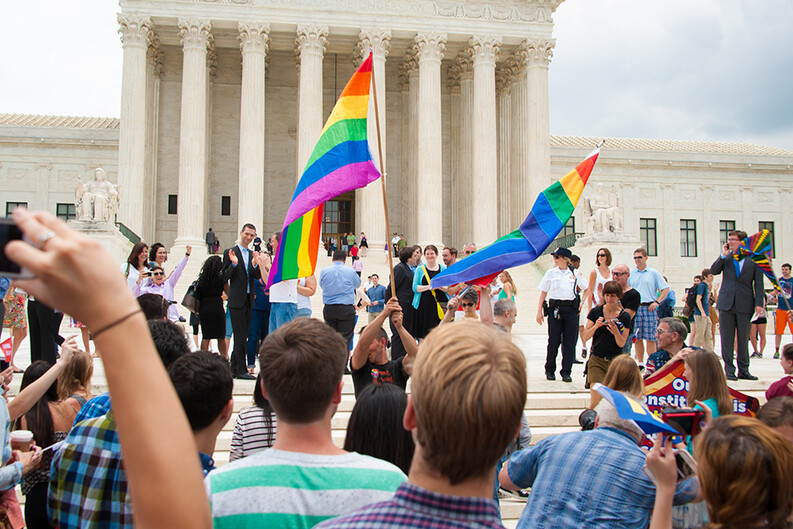Professor NeJaime on the Respect for Marriage Act

On Dec. 8, the Respect for Marriage Act passed the House with bipartisan support 258–169, sending a bill to protect same-sex marriages at the federal level to President Biden’s desk for his signature. In late November, the bill passed the U.S. Senate with similar bipartisan support, 61–36.
The legislation requires states and the federal government to continue to recognize same-sex marriages, reaffirming some of the protections granted in the Supreme Court case Obergefell v. Hodges.4
President Biden signed the bill into law on Dec. 13.
Below, Anne Urowsky Professor of Law Douglas NeJaime5 explains some of what the Respect for Marriage Act does and doesn’t do. NeJaime is an expert on family law, legal ethics, law and sexuality, and constitutional law. He has been a leader on efforts to reform parentage laws6 to accommodate families that feature nonbiological parent-child relationships, including those formed by same-sex couples and through assisted reproduction.
Douglas NeJaime: The Act does something important. It essentially codifies the Court’s decision in United States v. Windsor, striking down part of the federal Defense of Marriage Act and thus requiring the federal government to treat marriages of same-sex couples as valid. The Act also repeals another part of the Defense of Marriage Act, requiring states to treat marriages of same-sex couples from other states as valid. In this sense, it is more related to Windsor, than to Obergefell.
While recognizing this important step by Congress, I have two main concerns.
The first relates to what the Act does. The Act contains religious accommodations, commonly understood as important compromise points in the legislative process. Some accommodations are simply restatements of what the First Amendment would provide — for example, that churches only solemnize marriages that are consistent with their beliefs. But I worry that other accommodations go beyond existing law, allowing religious nonprofit organizations to refuse to provide goods or services that may be available generally to the public when doing so is seen to be “celebrating” a marriage to which the organization objects. What does it mean to “celebrate” a marriage? I have written about the potentially troubling consequences of language of this kind in religious accommodations relating to marriage in “Marriage Inequality: Same-Sex Relationships, Religious Exemptions, and the Production of Sexual Orientation Discrimination7.” Consider a case. In Bernstein v. Ocean Grove Camp Meeting Association, a nonprofit ministry organization was found to have violated New Jersey antidiscrimination law by refusing to permit a same-sex couple’s civil union ceremony on a beachfront boardwalk pavilion it owned and that it rented to others for various events and ceremonies. Do they now have a new basis on which to engage in the refusal? The religious nonprofit in that case seems to have denied, in the words of the Respect for Marriage Act, “facilities . . . for the solemnization or celebration of a marriage.” Would these new federal accommodations preempt contrary state law, like that in New Jersey?
The second concern relates to what the Act can’t really do. It can’t shore up the legitimacy of Obergefell in the courts. And Obergefell’s meaning — the respect the decision gets — matters to other important questions. For example, consider parentage. When a woman in a married same-sex couple gives birth, she and her spouse should both be treated as legal parents based on the marital presumption of parentage that has long applied to married different-sex couples, treating the birth mother’s husband as the legal father. Two years after Obergefell, the Court applied that decision in Pavan v. Smith to require Arkansas to issue birth certificates listing both women in a married same-sex couple as parents when one of them gives birth. But this question, and related questions of parental recognition for LGBTQ families, continue to be litigated in federal and state courts. I have written about these issues and the relevance of Obergefell at length in “The Constitution of Parenthood8” and “The Nature of Parenthood9.” The Act says nothing explicit about parentage, or the holding in Pavan. And if judges decide, after Dobbs, to treat Obergefell as less worthy of respect as precedent — as simply requiring the state to license marriages for same-sex couples, rather than give more full-throated respect to same-sex couples’ families — then the rights of same-sex couples remain under threat.


